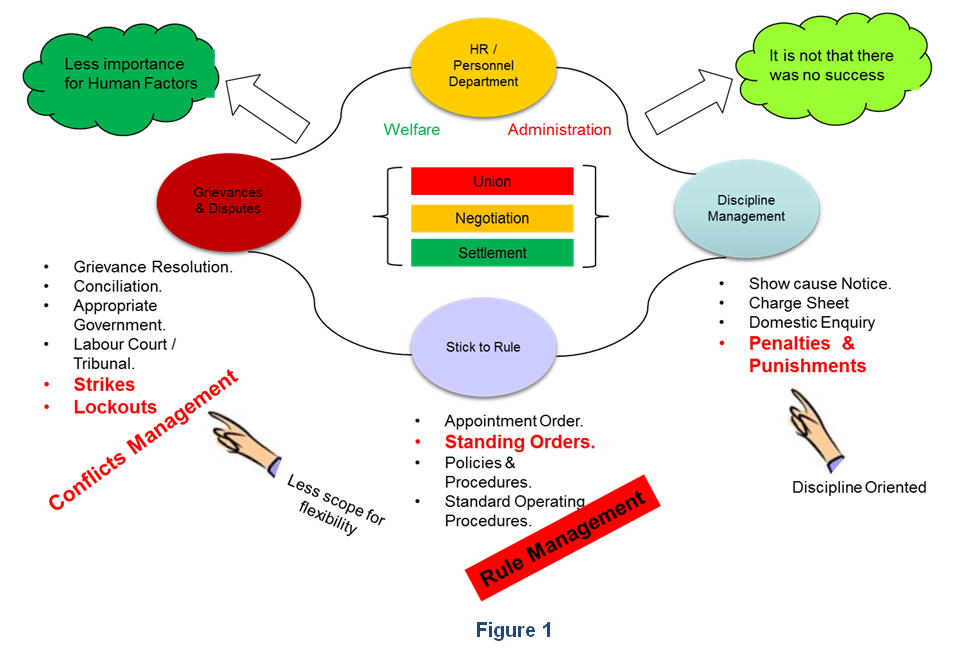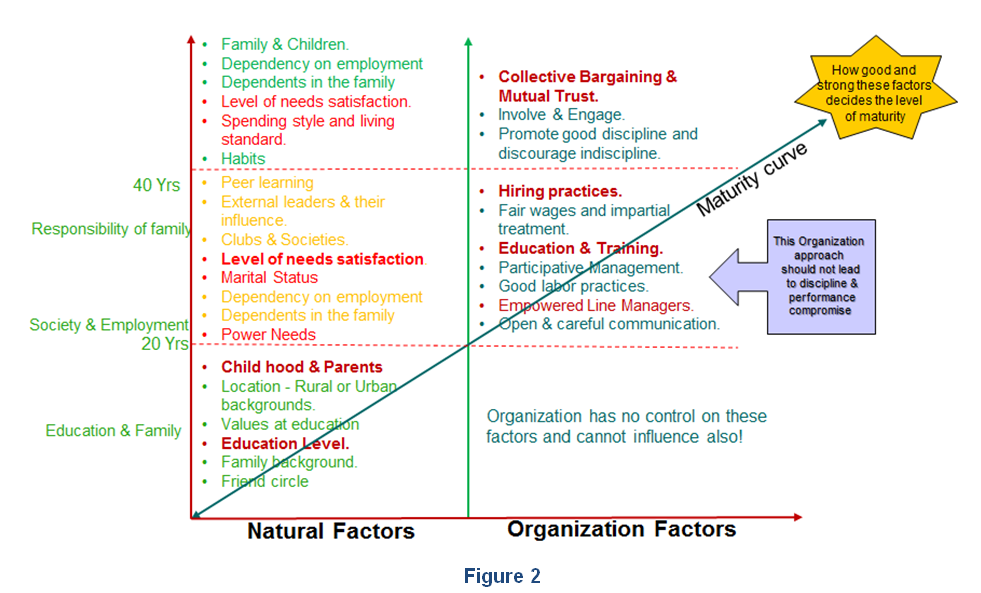|
Govindaraju N.S. General Manager- Human Resources Kern-Liebers (India) Pvt. Ltd, Antharasanahalli, Tumkur President Greater Nelamangala Industries Association, Nelamangala A simple issue or a petty demand, which would have otherwise easily ignored or given up or agreed had led to the serious damage to the very existence of the industry. I can give many examples starting from a petty demand for a plastic cover to carry confectionery items sold at discounted prices in the company for the employees, which actually triggered high magnitude industrial unrest and eventually led the closure of industry which also left more than 500 families on the street.Take another example, we must have read this in the newspaper, a company decided to lockout because of 10 Paisa disagreement in the settlement (an example occurred about 20 years before) and left more than 1000 families on the street. What do we understand by this? The Union or the workers would have ignored simply or given up or the management would have agreed to consider it, as it was a petty matter. The more realistic approach would have avoided the industrial unrest and the company would have continued the existence. It is all about maturity of people. Had they thought a little and acted maturely, serious trouble would have been averted. Is there a solution or an approach to deal with such complexities?One can find answers to these in the maturity model or the Human Relations/Human Factor based approach. I have dealt the conventional approach and Human Relations approach in detail in this article. I have also dealt what actions and approach of an employer leads to building progressive unionism which benefits both employers and workers at large. When we hear ‘Industrial Relations’, certain specific words may roam in our mind – Union, Negotiation, Settlement, Grievance, Disputes, Strike, Lockout, Charge Sheet, Domestic Enquiry, Suspension, Dismissal, etc. These words give a sense of conflict and show a very ‘red’behaviour and do not give a positive sense and inspiration. No doubt, these terminologies are an essential part of the Industrial Relations. However, of late, there is a shift in the thought process and have changed the perception of Industrial Relations. This makes us draw a distinction between conventional IR approach and Human Factor or more specific Human Factors/Human Relations based approach. The conventional IR approach has less flexibility and has a limited importance for Human Factors or Human Relations. Whereas the modern thinking and approach work towards building progressive unionism through understanding human behaviour, building collaborative relations and maturity of individuals who are keyplayers in Industrial Relations. 1. Conventional IR Approach It is not the question we are dealing whether a conventional IR approach is existing today or not. The very basic matter I am trying to address is what difference you will find between the conventional IR approach and Human Factor (HF) or Human Relation(HR) based approach. These two approaches are very well existing today and the practice depends on the individual maturity, education, thinking process, and awareness of the behavioural trends. However, the younger generation claims that they belong to the second group and practice HR based approach in dealing with Industrial Relations and one can experience good success also with this approach. The highlights of the approach are summarised as detailed below (Also see figure 1).
Visible drawbacks of Conventional IR Approach A critical and holistic view will give us major pitfalls in the approach. I have tried to list few such drawbacks.
2. Human Factors – Human Relation Approach The modern approach believes in the contribution of human factors in IR management. Different aspects of human behaviour and relations are given importance in the effective management of IR. More specifically rely on the maturity of the parties. I will discuss the maturity aspect in detail and how it can be proved to be a strong model in shaping the IR to the advantage of both parties.It is true that “maturity levels of both management and union/workers are the key to better Industrial Relations. Developing maturity and nurturing is the responsibility of HR & Management Leadership. Matured leaders and parties create wonders for their followers and for the company. Immature leadership leads to difficulties and losses for both company and their followers”. These are the main foundation of this approach. Different factors influence the development of maturity among parties. The approach tries to identify these factors and makes a constant effort to improve the maturity while they are in the organisation through certain planned interventions. Even though the maturity of both parties is essential for better Industrial Relations, one party has to essentially should exhibit utmost maturity and that should only be management/ employer. When the employer has decided to run the business by engaging manpower, it becomes his/her responsibility to create and nurture the maturity among workers and union. The Employer has no escape, but to have the right maturity if not it leads to the gradual downfall of the business. Immaturity of employer and management leadership leads to reverse effects and causes serious damage to the business. Hence, it is appropriate to focus on developing the maturity of worker and union rather than focusing on employer maturity. The employer maturity is given. There are two factors which influence the development of maturity of workers – Natural and Organisational factors. The basic components of this model are depicted in the following diagram (See Figure 2). A worker is a human being first and then the worker. The maturity of worker decides the maturity of a union. Higher maturity among workers creates matured unionism. Hence, the maturity of workers to be focused first and then the maturity of a union. There are two factors which influence the maturity of the individuals/workers with reference to industry. They are Natural Factors and Organisation Factors. Natural Factors and Level of Maturity Humans are social animals. The society and the conditions of the society they live in have great influences on ones’ maturity. The greater and positive are the influences, the greater and higher the level of maturity among individuals. The low living conditions of individuals, worst negative conditions of the society in which he/she lives in will have a negative influence on the development of individual maturity. When these individuals are hired by the employer these influences play a greater role and complexity in the development process. The development depends on these factors’ intensity and the level of positivity or negativity.Hence it is important to understand the natural factors which influence the individual maturity.
Organisation Factors and Level of Maturity Employers have no control and cannot practically influence the development process during the early stages of an individual development unless the employer is actively engaged in improving the education in a particular area through CSR initiatives. However, an employer through organisation policies, procedures, initiatives, and practices can support and bring the right behaviour and maturity among their workforce. This leads to the positive reinforcement as the behaviour and maturity get altered or modified due to the interventions carried out by the employer. Let us look at certain steps of an employer which can support these statements and approach.
I have discussed a few thoughts on building accepted behaviour and right maturity among workers and there are many other initiatives which can support this process. However, a caution needs to be exercised in the implementation of these steps. There is a chance that this may lead to lenient approach among workers and management leadership. There have to be checks and balances to avoid discipline compromise and any such compromise should be taken to strict disciplinary process. A trigger which can bring maturity and matured leadership among union and workers. It is not guaranteed that an employer will always be successful in developing the right maturity. Things go beyond his control. This may be due to management leadership or union leadership. When things go beyond his control, a serious industrial unrest lead to difficulties for both parties. At this juncture, a matured leadership may crop up among workers and come forward to lead the workers in a progressive way. It is the employers call to sense this development and nurture it with acceptance. A senior wise man always used to tell me and probably still saying! “Once ‘escalation’ (Strike/Lockout situation) has to happen’ then maturity comes on its own”. Yes! May be necessary if management exhibit highest maturity and workers/Union becomes unfair and starts indiscipline and show non-co-operation to show their power. It is quite true also, workers and union learn through this process and become more sober, mature and co-operative. But Management has to still exhibit higher maturity and be fair always. However, no doubt that the approach with human factors and maturity model support in building progressive unionism. I recently attended a CII conference on Operational and People excellence where Tata Motors, Lucknow presented their case and the Union General Secretary addressed the audience. What is important to mention here is that there was a 6 month lockout 17 years before, which gave way for matured leadership among workers and no turning back then onwards. The Management accepted positively and nurtured the development which benefited both company and workers. What if the employer is immature? Is there a way to build maturity among employer also? I said before that the management maturity is given and no escape as it is their call to run the business. I would like to deviate a little and complicate my above statement. Is this always possible and realistic? There are managements which are immature and got into trouble. You may also question me, what a big deal to tell how to build maturity among workers and union? Tell me how to build maturity among management leadership or employer? That is the tough task! The answer is, it is not that there are no approaches and ways available. Let us ask a question to ourselves? Who is an employer or Management? They are also people right! The Management leaders or employer learns through the same process as of workers, but the extent and speed differs. There are specific approaches and ways are available to accelerate the employer maturity which I will address probably in my next article. 3. Progressive unionism and Industrial Relations It is all about dealing things with a humane approach and understanding the influencing factors which otherwise can lead to conflicts. Before we get into the approaches, which lead to progressive unions, it is important to understand the terms ‘Progressive Unionism’ and “Industrial Relations’. What is progressive unionism? What is Industrial Relation? Different people may provide different definitions. However, a more practical definition can give a better understanding of the concept. My definition is as below for both terms. What is Progressive unionism? “Creating a union which balances the rights and expectations of workers and employer. Believes and practices in solving grievances and disputes through mutual discussion and negotiation. A union which does not believe in arm-twisting and unfair practices”. What is Industrial Relations? My definition of IR is “Managing relations between Management and Workers/Union without conflicts” If we understand why conflicts occur and address the influencing factors in a best, effective,and positive manner, then there is a high chance of building progressive unionism. I have tried to identify the various influencing factors based on my experience and an amenable approach which neutralise the situation and facilitate in building progressive unionism. This approach does not come with fool-proof and error-free and it should not be taken also that it works at all times. There are complexities and debatable questions in each approach. It is also not that those complexities cannot be addressed, different methods and approaches have to be adopted in resolving those complexities and ambiguities. Let us look at certain influencing factors and approach to neutralise them. Well, the answer could be a fair and unbiased approach to avoid the union formation, but still, workers form a union. The reasons for union formation are many which may include safety and security needs, external influences, political interest of the trade union federations, etc. The Organisation has to find different approaches to address these influences and complexities. The Employer has to decide what is best for the organisation considering the consequences if he/she decides not to go with the viable and positive approach. The consequences of the complex approach are many and come with the huge cost and the real situation is that many companies have accepted the reality and continued in the business and still counting progressive years. This is possible only when the management is able to answer what is best for the organisation? Balancing expectations can prove to be a right strategy which benefits both the parties. But the complexity is “Is balancing possible? No doubt it is difficult, but not impossible and it all depends on the maturity of leadership and approach of parties. Oneside maturity can be a good point, but if both parties are mature, then balancing may not be very difficult. Management leadership has to constantly try to build maturity among workers and union, but what about the maturity of employer and management leadership? Is this given? I have addressed this already in detail. You cannot expect the maturity from the workers and union by default, they may acquire the right maturity due to right leadership but it cannot be guaranteed and expected always. Hence it is appropriate to have a strategy to work towards building the right behaviour of workers and union through education and training initiatives. The organisation has to make sure that the competent leadership is hired and put in place to take care of this. The Employer may have right forum and approach to address grievances effectively, but if there are unfair grievances which are vested interest and malafide intention induced, then it is necessary to adopt different methods and approach to mitigate this kind of situation. Being strict and intolerance to indiscipline may definitely help but it comes with consequences. The Employer is expected to behave maturely even when the conflicts are induced by vested interests and unfair practices by the workers and union. Does matured behaviour and intolerance to indiscipline helps during this situation? The answer is yes, but it comes with serious consequences which may be harmful to the interests of an employer, but there is no other alternative left but to rely on intolerance to indiscipline. It is tough to keep the external leaders away. Even if it is possible to keep them physically away, their influences cannot be kept away. The right approach is to develop desired trust and rapport. But the danger comes if he/she has individual interests and ulterior motives. Few employers rely on external leaders too much. This may be evaluated based on how effective and positive he/she is. It is also not that there are no good leaders in the field. A proper care has to be exercised in dealing with this matter. Normally in the initial stages of union development, this phenomenon is very high. The need to establish themselves and their power in the company leads to high unrest and conflicts. This phase is very crucial for the employer and any wrong steps can create a legacy in the company and becomes very difficult to handle in the future. Hence,being firm and having the intolerance to indiscipline without being unfair is necessary. This approach definitely creates strong conflicts, but it is highly necessary to be intolerant in the interest of business. Even with all this effort and approach, there are instances of conflicts and industrial unrest and a better industrial relation is not guaranteed. There are various influencing factors such as the vested interest of external and internal leaders, incompetency of management leadership, failure of management, political influence in internal matters, poor business conditions etc. The Organization has to adopt different strategies to address these factors. But the probability of success is higher if the employer adopts positive approaches in managing industrial relations and right maturity and behaviour. It is very easy to lead towards conflicts and industrial unrest, but very difficult and time-consuming to develop progressive unionism. The efforts and approach of employers have to be well thought of and executed in the right spirit. Govindaraju NS General Manager- Human Resources Kern-Liebers (India) Pvt. Ltd, Antharasanahalli, Tumkur This is Google Group created for HR professionals. More than 1000 HR professionals are in the group. The members of the group are permitted to share HR Articles, HR Job Postings, and Announcements on Seminars / Workshops / Training Programmes. This group is created, controlled, and managed by Niratanka Team.
11 Comments
2/20/2018 11:18:21 pm
The Wise Men Says, Maturity comes when you stop expecting from someone. But as far as union workers are concerned it’s totally opposite. It’s my experience.
Reply
MAHESH. H
2/21/2018 12:10:47 am
Dear Sir,
Reply
Narasimha Bhat D.K, Vice President,Toyota Techno Park
2/21/2018 01:24:41 am
Thought provoking Article .Can be practical guide for young IR professionals.Majority of the occasions employees are unnecessarily blamed for Managements inability to deal labor relations effectively.
Reply
Ravi N Avaradi, Sr.Manager - HR & IR, CDC, Tumkur
2/21/2018 03:54:46 am
Govindraju, article is very informative and it is written with the passion in IR. You have put your experience and your knowledge in a structured way is really appreciable. Yes it true that maturity among union leaders / members and management plays an vital role while making decision in IR.
Reply
2/21/2018 08:24:29 am
Very true flexibility on the part of Management and Maturity on the part of Trade Union does wonders . The best case that comes to my mind , thinking on these lines, is the Trade Union in Bajaj Auto ltd. The union which went on strike for 40 day’s demanding bonus shares and no wages for the strike period, today talks of cooperation and collaboration and functions accordingly. I could only add that when we all instead of competing with each other start collaborating there would be celebration and this applies to Management and Trade Union Relations as well
Reply
Kiran HV
2/21/2018 09:11:33 am
Thank you so much for the detailed information, certainly it will be very helpful for all of us. Awaiting more articles from you to understand and share the knowledge on the same.
Reply
Lakshmikanth K p
2/21/2018 10:03:27 am
Govind Sir,
Reply
Ravichandra Bekal
2/21/2018 09:08:18 pm
Dear Govindaraj, Your article on IR has touched upon various dimensions of Industrial Relations. Good info to practicing IR professionals.
Reply
Dhirendra Kumar Thakur
2/21/2018 11:45:43 pm
The article talks about the right approach in current business scenario and it is right time for IR or HR professionals to talk and move in the new direction talked about Mr Govindaraju.
Reply
K.G.Poovanna
2/22/2018 11:19:28 pm
Indeed. it is a great article about progress of good Industrial relations.
Reply
Govindaraj (Author)
2/23/2018 12:02:47 am
You are absolutely right sir. I also touched upon the vested interest of external union leader. It requires different thinking and approaches. Will try to cover in the next article.
Reply
Your comment will be posted after it is approved.
Leave a Reply. |
RAMESHA NIRATANKACategories
All
Nirathanka Citizens Connect50,000 HR PROFESSIONALS ARE CONNECTED THROUGH OUR NIRATHANKA HR GROUPS.
YOU CAN ALSO JOIN AND PARTICIPATE IN OUR GROUP DISCUSSIONS. |





















 RSS Feed
RSS Feed




